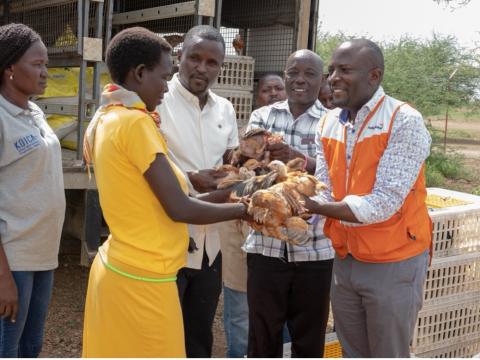World Vision Empowers 332 Pastoralists in Turkana West to Practice Poultry Farming Amidst Climate Change

Oropoi Village in Turkana West, located in northern Kenya, a region known for its kraal settlements, faces significant challenges during times of water and pasture scarcity. The village, situated over 204.3 km from Lodwar—Turkana County headquarters—is also vulnerable to cattle rustling activities, especially from the neighboring border communities in Uganda. As failed rainfalls become more frequent, pastoralism becomes an increasingly unsustainable economic activity for this community.
At Our Lady of Sorrow Catholic Church in Oropoi, a group of 20 members gather for poultry farming training organised by World Vision. Each member has a tale to tell—losing their livestock to drought. The church hall, now a vibrant classroom, is filled with eager participants. All group members—women and youth—keenly listen in as the training facilitator explains familiar yet exciting concepts like constructing a poultry house, improvising poultry feeders and drinkers, and grinding poultry feeds.

You might wonder why men are not part of this training. Benson Lopiyo Ngipeyok, a Community Mobilizer, explains that in this pastoral community, keeping livestock, including goats, cattle, donkeys, and camels, is traditionally a male responsibility. “The bigger the herd, the richer a man is perceived to be, although this wealth does not benefit women. Women care for cows and goats but do not own them,” he says.

For the people of Turkana, chicken rearing and consumption were once unfamiliar activities. However, erratic weather patterns and recurring droughts have killed livestock, leaving the community with no option but to explore other means of survival through diversifying their sources of livelihood.
Sheila Naini, a World Vision project officer, puts this situation into perspective: “Persistent droughts have caused food insecurity and economic hardships affecting children and families in this community that once relied on livestock for income; therefore, the community desperately needs more innovative and effective solutions for sustainable food production.”
With funding from the Korea International Cooperation Agency (KOICA), World Vision partnered with the County Government of Turkana and other stakeholders to support refugees and host communities in establishing kitchen gardens and rearing small livestock to improve food security and nutrition. This was achieved through the Kalobeyei Integrated Drought Response & Management (KDREAM) Project.

“We are training this group on how to formulate feeds at home because we want farmers to use locally available and cost-effective resources to prepare feeds for their poultry,” says Mr. James Atana Ekuwom, Turkana West Sub-County Senior Livestock Officer, while facilitating one of the sessions.
Poultry farming is an adaptation practice that is resilient to climate change. Although chicken rearing requires minimal space and feed, they provide significant benefits. They offer meat and eggs that enhance family nutrition and income, as well as organic fertilizer for those who wish to diversify into kitchen gardening.
According to Mr. Atana, this environment suits kitchen gardening and poultry rearing, but the community's knowledge and resources on agro-pastoral practices are limited. He stresses, “When people migrate, especially during drought seasons, poultry can provide a stable source of meat and eggs for vulnerable families, as chickens can survive even in harsh environments. However, many community members lack that knowledge because they are stuck to their traditional way of doing things.”
Sharon Akuwom Epero, a mother of three from Oropoi Village, is an early adopter of chicken rearing, having benefited from poultry training introduced in her community by World Vision’s Kalobeyei Integrated Drought Response & Management (KDREAM) Project.
“We have been trained on the nutritional value of chicken and eggs, chicken rearing practices, and basic skills in constructing poultry houses and equipment, as well as preparing poultry feeds,” says Epero.
After the training, Epero was motivated to start rearing chicken because it was the only livestock a woman in her community could fully own and manage. Since the improved chicken breeds introduced by World Vision only lay eggs and do not brood, she borrowed one local breed for brooding.
She explains, “I didn’t know chickens could be beneficial. Today, I have fifteen chickens and a steady supply of eggs, enough to provide a balanced diet for my children. Thanks to the training I received from World Vision, I can sell some to meet other family needs.”
Since February 2022, the KDREAM Project, in collaboration with the County Government of Turkana's Department of Livestock, has trained and supported Epero and 332 other farmers from Turkana West. Each household has benefited from six improved kienyeji [local] chicks, 8 kilograms of chick mash, and Amilyte, enabling them to practice poultry farming, diversify their livelihood sources, and enhance community resilience to climate change.
Epero also grows amaranth, cowpeas, kale, pumpkin, and spinach in her kitchen garden. The chicken droppings provide manure for her kitchen garden, and the litter is fertilizer for her vegetable garden. These vegetables supplement her family’s traditional meat and milk diet, making her children healthier.
Poultry farming presents unique challenges in this Arid and Semi-Arid Land (ASAL), where eagles, snakes, wild dogs, and wild cats threaten chickens. However, regular training on poultry management and proper poultry house construction has helped farmers avert these challenges. Feed costs are also high, so farmers have been empowered to improvise using locally available resources.

Various farmer groups in Kalobeyei have now embraced kitchen gardening and poultry rearing as climate change mitigation measures, thanks to the support they received from World Vision. However, Newcastle disease is a major threat to poultry farming, which the KDREAM Project, in partnership with the County Government of Turkana, is addressing by offering vaccines to enable these farmers to vaccinate their chickens regularly.
Epero notes that instead of relying solely on vaccines, which may not always be available, she sometimes uses Indigenous plants, like aloe vera, to protect her poultry from such diseases.
By Felix Pilipili, Communications Specialist, World Vision Kenya